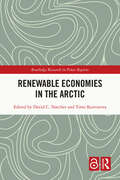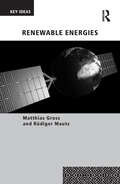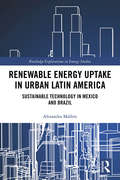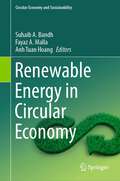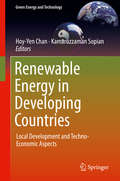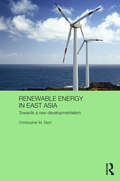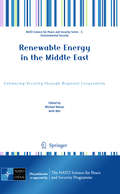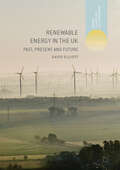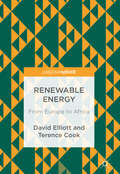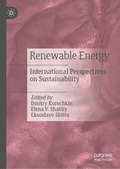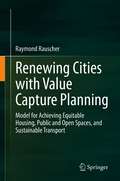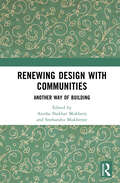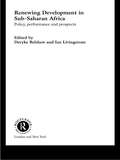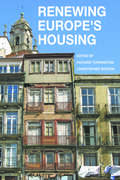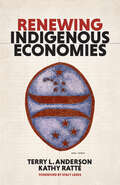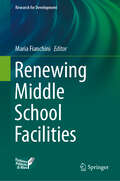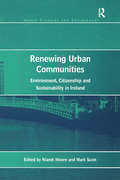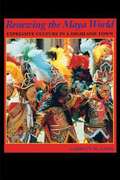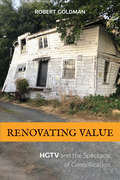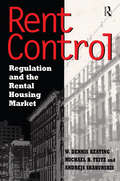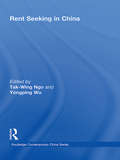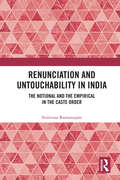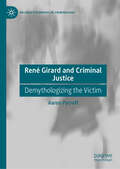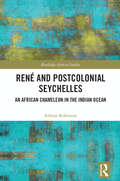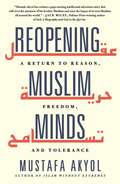- Table View
- List View
Renewable Economies in the Arctic (Routledge Research in Polar Regions)
by Timo Koivurova David C. NatcherThis book offers multidisciplinary perspectives on renewable economies in the Arctic and how these are being supported scientifically, economically, socially, and politically by Arctic states. The economic development of the Arctic region is witnessing new, innovative trends which hold promise for the sustainable development of the region. This book discusses the emerging forms of renewable economies to understand where intellectual and technological innovations are being made. It draws on the expertise of scholars from across the Arctic and provides the reader with a foundation of knowledge to identify the unique challenges of the region and explore opportunities to unlock the immense potential of renewable resources to boost the region’s economy. This book offers a holistic Arctic perspective against the backdrop of prevailing social, economic, and climatic challenges. With critical insights on the economic state of play and the role of renewable resources in the development of the Arctic region, this book will be a vital point of reference for Arctic scholars, communities, and policy makers.
Renewable Energies (Key Ideas)
by Matthias Gross Rüdiger MautzRenewable Energy normally refers to usable energy sources that are an alternative to fuel sources, but without the negatively evaluated consequences of the replaced fuels. Although energy issues have a long tradition in sociology and other social sciences, it may now be high time to conceptualize these in sociological terms as the lynchpin in our understanding of the way societies are set to develop in the 21st century. This concise book focuses on sociological attempts at better framing contemporary theories of energy transformations and to deliver an accessible overview on the relationships between different types of renewable energy sources and their practical usages in modern societies. A strong focus is laid upon new forms of environmental governance and unavoidable knowledge gaps triggered by attempts to transform contemporary energy systems to renewable ones. Critical topics include the challenge of transition from centralized to decentralized system structures, the integration of renewable energies into existing energy structures or the replacement of these, coping strategies to unforeseen risks and conflict issues, and socio-cultural reservations to new technologies connected to renewable energies.
Renewable Energy Uptake in Urban Latin America: Sustainable Technology in Mexico and Brazil (Routledge Explorations in Energy Studies)
by Alexandra MallettThis book explores the perplexing question of how to increase sustainable energy technology use in the developing world, and specifically focuses on two megacities within Latin America. Renewable Energy Uptake in Urban Latin America examines the market and uptake of two sustainable energy technologies (solar water heaters and biogas to produce electricity) in two locations, Mexico City, Mexico and São Paulo, Brazil in the 2000s. Drawing from three systems-based analytical frameworks – including one developed by the author for the purpose of this study – the book examines the varying factors affecting the implementation of renewable energy technologies (RETs) in urban Latin America. These frameworks emphasize the importance of examining socio-political dimensions; rather than conventional explanations that focus on technical and economic aspects only. By doing so, the research improves explanations about renewable energy technology (RET) adoption in the global South. These findings are useful for scholars, policy makers and practitioners working on RET adoption; resulting in a book which helps to inform wider debates regarding innovation, decarbonization, sustainability transitions and energy system change. This book will be of great interest to students and scholars of energy transitions, energy policy, development studies and science and technology studies.
Renewable Energy in Circular Economy (Circular Economy and Sustainability)
by Suhaib A. Bandh Anh Tuan Hoang Fayaz A. MallaThe book provides a comprehensive overview of the technologies and processes involved in renewable energy generation, with a specific focus on their role in improving the circular economy. It offers all the necessary information and tools to help readers select the most sustainable renewable energy solution for different conditions.Exploring real-life examples, the book delves into the practical applications of the circular economy in the renewable energy sector. It takes a multi-faceted approach, examining the circular economy from various perspectives and incorporating methods such as lifecycle assessment, sustainability assessment, multi-criteria decision-making, and multi-objective optimization modes. Furthermore, the book explores the concept of blockchain, hybrid renewable energy models, technologies, and implementation. It also investigates the critical factors and key enablers that influence sustainable development in this field. By doing so, it not only facilitates the transition to a circular economy but also highlights the shift in recent research, trends, and attitudes towards a more scientifically grounded approach.The primary objective of this book is to compile research specifically focused on the circular economy in renewable energy. By providing researchers and policymakers in the energy sector with the necessary scientific methodology and metrics, it enables the development of strategies for a sustainable transition. This book serves as a valuable resource for students, researchers, and practitioners seeking to deepen their understanding of energy planning and the current and future trends of biofuel as an alternative fuel.
Renewable Energy in Developing Countries: Local Development And Techno-economic (Green Energy and Technology)
by Hoy-Yen Chan Kamaruzzaman SopianThis book discusses aspects of policy and techno-economic analysis of renewable energy in developing countries. Renewable energy technologies have been one of the most important strategies in addressing sustainable energy development and climate change. The roles of renewable energy in developing countries are vital, which include the accessibility of modern energy services in rural areas, climate change mitigation, energy security, green job creation and eventually improvement of quality of life. Part I of this book focuses on policy and strategy, while Part II focuses on technology development and feasibility. Chapters are contributed by leading experts from the ASEAN Center of Energy, government agencies, industries, and universities from five developing countries, including Malaysia, Indonesia, Vietnam, Brunei Darussalam and Bangladesh.
Renewable Energy in East Asia: Towards a New Developmentalism (Routledge Contemporary Asia Series)
by Christopher M. DentEnergy is crucial to the functioning of any human society and central to understanding East Asia’s ‘economic miracle’. The region’s rapid development over the last few decades has been inherently energy-intensive and the impact on global energy security, climate change and the twenty-first-century global system generally is now very significant and will become more so over foreseeable years and decades to come. The region is already the world’s largest energy consumer and greenhouse gas emitter, so establishing cleaner energy systems in East Asia is both a regional and global challenge, and renewable energy has a critically important part to play in meeting it. This book presents a comprehensive study of renewable energy development in East Asia. It begins by examining renewable energy development in global and historic contexts, and situates East Asia’s position in the recent worldwide expansion of renewables. This same approach is applied on sector-specific chapter studies on wind, solar, hydropower, geothermal, ocean (wave and tidal) and bioenergy, and to general trends in renewable energy policy. Governments play a critical role in promoting renewables and their contribution to tackling climate change and other environmental challenges. Christopher M. Dent argues this is particularly relevant to East Asia, where state capacity practice has been increasingly allied to ecological modernisation thinking to form what he calls ‘new developmentalism’, the principal foundation on which renewables have developed in the region as well as how East Asia’s low carbon development is being generally promoted. Renewable Energy in East Asia will be of huge interest to students and scholars of Asian studies, economics, political economy, energy studies, business, development, international relations and environmental studies. It will also appeal to researchers working on the subject matter in government, business, international organisations, think tanks and civil society organisations.
Renewable Energy in the Middle East
by Michael Mason Amit MorEnergy insecurity is not normally associated with the Middle East. However, away from the oil-rich Persian Gulf, the countries of the eastern Mediterranean are particularly vulnerable. Their fossil fuel endowments are low, while their fractious relationships with each other have long fostered wider political insecurities. Focusing on the Jordan Basin (Israel, the Palestinian Territories, Lebanon and Jordan), this timely volume addresses the prospects for the adoption of renewable energy in the oil-poor Middle East. Featuring regional energy experts, it offers an invaluable survey. After outlining the regional security context, this book first reviews renewable energy policy and practices in the Jordan Basin. It then considers options for greening energy use, including promising pilot projects in North Africa. The initiatives discussed encompass renewable energy finance, energy-efficient rural communities, and solar and wind energy. There is significant potential for an increase in the uptake of renewable energy technologies in the eastern Mediterranean. This window of opportunity has been created by high oil prices, energy infrastructure investment opportunities, and the UN climate change regime. In conclusion, the book considers the institutional conditions for collaborative decision-making on renewable energy. Such cooperation would deliver substantial security and human development benefits to the region, and indeed the world.
Renewable Energy in the UK: Past, Present and Future (Energy, Climate and the Environment)
by David ElliottThis book offers a detailed account of how renewable energy has moved from the margins to the mainstream in the UK, and of the battles that have been fought to achieve this, trawling through the often troubled history of government involvement. The book examines how renewables became what now seem likely to be the dominant energy sources of the future. Renewable energy technologies, using solar and wind power and other natural energy sources, are now supplying around 30% of UK electricity and appear set to continue expanding to supply around 50% within the next decade. Although the emphasis of the book is on the UK, developments there are compared with those in other countries to provide an overall assessment of the relevance of the UK experience. Chapters explore why the UK still lags behind many other countries in deploying renewables, in part, it is argued, due to its continued reliance on nuclear power. The book ends with a discussion on what sort of changes may be expected over the coming years. The author does not assume a single answer, but invites readers to consider the possibilities.
Renewable Energy: From Europe To Africa (Issues In Environmental Science And Technology Ser. #19)
by David Elliott Terence CookSignificant progress has been made by industrial countries to reduce emissions from the use of fossil fuels, but as the economies of the less-developed regions of the world begin to expand, they too will face similar challenges. This book looks at energy transitions being made in developing countries, focusing on the adoption of renewable energy systems in Africa, for example under the UN Sustainable Energy for All programme, but also by the EU in the Former Soviet countries of Eastern and Central Europe. It draws on experience from involvement with programmes in the EU and Africa and will be of great interest to academics, policy makers and practitioners in the development aid and renewable energy policy fields.
Renewable Energy: International Perspectives on Sustainability
by Elena V. Shabliy Dmitry Kurochkin Ekundayo ShittuThis book bringing together leading researchers in the field of renewable energy to discuss sustainability on a broad scale and to examine the status quo of renewable energy industry development in a global context. The volume starts with the European Union, then reviews current trends in the United States as well as the Middle East, Central Asia, and Latin America. It moves on to analyze the German transition to one hundred percent renewable energy economy and energy systems (Energiewende) with a climate protection plan and sustainable economic development; and continues on to examine the determinants of the adoption of sustainable solutions in Finland and discuss the renewable energy agenda in the European Union with the 17 Sustainable Development Goals at its core. Climate change has become one of the main global drivers for policy and this book discusses both it’s over all global development as well as spotlighting localized progress across multiple continents. Over one hundred and fifty countries have developing sustainable energy policies, tax incentives, and laws. China remains the leader in renewable energy generation; and countries including the United States, the UK, India, Spain, and Turkey, compete in the Renewable Energy Sector to attract investments. In 2018, global investments in renewables exceeded $200 billion. The state of Bahia in Brazil has been experiencing a surge in wind energy production; and public policy has had a positive effect on that expansion. Kazakhstan is a country with great renewable energy prospects, particularly in wind, hydropower plants, and solar energy. This book is a comprehensive overview and invaluable reference for all those in the renewable energy sector.
Renewing Cities with Value Capture Planning: Model for Achieving Equitable Housing, Public and Open Spaces, and Sustainable Transport
by Raymond RauscherThe book offers a model for city development and renewal based on land value capture (called ‘value capture’). Firstly, a review is presented of cities around the world that are currently using value capture. From these city examples the author shows how any state, city or regional government can adopt value capture policies. Looking at recent events the author reviews the implications of the coronavirus pandemic (2020) for future planning (including value capture) of cities and regions (particularly noting healthy cities planning). The development of a value capture planning (VCP) model is then outlined. The basis of the model is reflected in its planning components, being: Housing (affordable, social and market housing); Public and Open Spaces (natural areas, open spaces and public spaces); and, Sustainable Transport (rail, bus, and active transport). The VCP model is devised to provide an economic and planning tool that can be utilised in addressing each of these planning components. This tool includes data entry tables and explanations of how these tables are applied. Four case study cities (within Australia) currently undergoing renewal are selected for the model to be applied to. The areas were chosen to represent contrasting urban settings and types of development and renewal, including: inner city, middle ring city; growth centre city; and, regional capital city. The current (2020) active renewal programs within these areas include (city in brackets): Central to Eveleigh Renewal Area (CERA) (City of Sydney); Sydenham to Bankstown Urban Renewal Corridor (SBURC) (Canterbury Bankstown City); Gosford City Centre Revitalisation (GCCR) area (Gosford City); and, Newcastle City Renewal Area (NCRA) (Newcastle City). The reader is walked through (graphically) the backgrounds of these case study cities, including geography, development trends and details of renewal plans. Conclusions on the VCP model application are outlined for each study area (within that chapter) and for the cumulative results across all study areas (final chapter). With these conclusions, the application of the model to any city or region anywhere in the world is outlined. Finally, on a practical level the reader would be interested in how value capture is administered through programs (including the roles of government, developers and the community). Summing up, the book offers the reader an understanding of current city planning and the tools (like value capture) that will be required for future planning.
Renewing Design with Communities: Another Way of Building
by Anisha Shekhar Mukherji and Snehanshu MukherjeeThis book looks at alternative ways of analyzing traditional and contemporary architectural design and building practices in South Asia with a special focus on India. It showcases how collaborative projects between architects and local communities and drawing from local building traditions can lead to sustainable and equitable practices in architecture. The volume includes an analysis of projects in rural, tribal, and urban areas of India and Nepal and first-hand accounts of architects, teachers, and professionals engaged in the theory and practice of design and architecture. It examines the differences between the individualistic and the collective approach and explores the meaning of architecture as a process and as a product and as a decentralized, ecologically, and locally sensitive way of designing. While comparing traditional and modern methods of building, it also examines the impact of each method on the community, the economy and the surrounding environment. This book will be of interest to researchers and students of architecture, urban studies, urban planning, urban ecology, urban geography, and sustainable development. It will also be useful for architects, planners, urban designers, and professionals associated with these disciplines.
Renewing Development in Sub-Saharan Africa: Policy, Performance and Prospects
by Ian Livingstone Deryke BelshawRenewing Development in Sub-Saharan Africa reviews the debates and brings together specialist contributions, to provide a clear guide to the major complexities of African development. They lay the foundation for designing a range of individual country-specific policy-sets, in which the strategic components are prioritized according to each country's constraints and opportunities. The emphasis of the book is on the identification of effective strategies that will enable individual countries to most effectively exploit their growth opportunities and to meet poverty-reducing and other key equity objectives.
Renewing Europe's Housing
by Edited by Richard Turkington and Christopher WatsonMany European cities have a shortage of good quality, affordable housing, but this problem has become less prominent in policy than it should be. This timely book aims to redress that balance. After an introductory chapter, expert contributors provide contemporary comparative accounts of housing renewal policy and practice in nine European countries in its physical, economic, social, community and cultural aspects. Shared concerns over energy conservation, social protection and inclusion, and the roles and responsibilities of the public and private sectors form the basis of a proposed policy agenda for housing renewal across Europe. The concluding chapters draw conclusions from a pan-European perspective and consider the future prospects for renewing older housing. Academics, practitioners, policy-makers and students of housing, urban studies, planning, regeneration, environmental health and sustainability will all want to read this book.
Renewing Indigenous Economies
by Terry L. Anderson Kathy RattéThe history of Indigenous economies in the Americas presents a puzzle: When Europeans first encountered Indigenous peoples, they discovered societies with high standards of living, vast trading networks, and flourishing markets. But colonizers changed the rules of the game, and by the twentieth century, most Indians had been forced onto reservations and saddled with institutions inimical to their customs and cultures, and incompatible with wealth creation. As a result of being wrapped in the federal government's "white tape," these once thriving societies are today impoverished and dependent. This volume charts a course for reversing the decline in Indigenous economies and establishing a path to prosperity based on secure tribal property rights, clear jurisdiction and governance, and fiscal and financial power. It explains how the rules of the game promote or hinder the development of wealth; gives an overview of institutional conditions in Indian Country today; and identifies improvements with significant potential to renew Indian economies. Both data and contemporary stories of success and failure illustrate how revitalizing institutional frameworks can restart the engine of economic growth to generate business and employment, raise living standards in Indian communities, and, most importantly, restore the dignity Native Americans once had and still deserve.
Renewing Middle School Facilities (Research for Development)
by Maria FianchiniThis book draws on important original transdisciplinary research to address a wide range of issues relating to the remodeling of existing schools for pre-teenagers to fit them to various novel teaching models (e.g. collaborative learning, ICT integration, and out-of-classroom working) and to create effective educational environments for the future.The strong relationship between people’s wellbeing, physical environment and student learning in schools has already been extensively studied in international research. At the same time, a number of different scenarios of possible innovations are now emerging, and these require conscious choices in terms of designing both the ways and the places where educational processes can be developed.The principal focus of this research was the relationship between infrastructure, activities, and school communities.The book is divided into three sections, the first of which discusses conceptual aspects and outlines innovative renewal strategies. The second section describes a participatory research process developed in five case studies of lower-secondary or middle schools with the aim of updating our knowledge about such schools and identifying emerging issues. The last section presents case studies, operational tools, and design strategies that aid decision-making and support interventions to renew school facilities. The book is intended mainly for scholars of architecture and education, but is also of interest to a wider readership, including principals, teachers, designers, decision-makers in school communities, and heads of municipal education departments.
Renewing Urban Communities: Environment, Citizenship and Sustainability in Ireland (Urban Planning and Environment)
by Mark ScottIreland is now an urban society, and both parts of the island have experienced rapid urban-generated growth and new patterns of development in recent years. This inter-disciplinary book adopts an all-Ireland perspective to investigate the tension that exists between sustainable urban development values and rhetoric - such as increased densities, brown field development, the compact city and social inclusion - and the emerging geography of urban Ireland, influenced by consumer and lifestyle choices. The introduction provides an overview of the dynamics of urban change, particularly during the 1990s, and the experience of rapid economic growth. The following chapters are divided into two parts, considering sustainable urban environments, and sustainable communities. This book will appeal to students, academics, policy and decision-makers, given that it adopts both a qualitative and quantitative approach, and introduces a range of new empirical studies covering both physical and social sustainable development.
Renewing the Maya World: Expressive Culture in a Highland Town
by Garrett W. CookEach year in the Highland Guatemala town of Santiago Momostenango, Maya religious societies, dance teams, and cofradías perform the annual cycle of rituals and festivals prescribed by Costumbre (syncretized Maya Christian religion), which serves to renew the cosmic order.
Renovating Value: HGTV and the Spectacle of Gentrification
by Robert GoldmanHGTV has perfected stories about creating and capturing value in the housing market. But according to Robert Goldman, this lifestyle network’s beloved flagship programs, Flip or Flop, Property Brothers, and Fixer Upper—where people revitalize modern spaces and reinvent property values—offer “fairy tales” in the wake of the 2008 economic crisis. The cable channel’s seductive, bingeable programs may show how to find and extract value from properties, but, in fact, they insidiously ignore the realities of the real estate and mortgage markets, housing inequality, gentrification, economic insecurity, and even homelessness. In effect, HGTV has turned house flipping into a master narrative about getting ahead in America during an era of otherwise uneasy economic prospects. HGTV pictures its insular moral economy as an alternative to a crisis-ridden neoliberal finance system that shaped landscapes of foreclosure and financial uncertainty for millions of households. Renovating Value explores the circuitry of consumer credit and debt, and a rent-gap model of gentrification that charts a path to the rehabilitation of Value. Goldman shrewdly critiques the aspirational myth of adding value to a home simply by using imagination, elbow grease, and aesthetic know-how.
Rent Control in North America and Four European Countries: Regulation and the Rental Housing Market
by William Smith Michael TeitzRent control, the governmental regulation of the level of payment and tenure rights for rental housing, occupies a small but unique niche within the broad domain of public regulation of markets. The price of housing cannot be regulated by establishing a single price for a given level of quality, as other commodities such as electricity and sugar have been regulated at various times. Rent regulation requires that a price level be established for each individual housing unit, which in turn implies a level of complexity in structure and oversight that is unequaled.Housing provides a sense of security, defines our financial and emotional well-being, and influences our self-definition. Not surprisingly, attempts to regulate its price arouse intense controversy. Residential rent control is praised as a guarantor of affordable housing, excoriated as an indefensible distortion of the market, and both admired and feared as an attempt to transform the very meaning of housing access and ownership.This book provides a thorough assessment of the evolution of rent regulation in North American cities. Contributors sketch rent control's origins, legal status, economic impacts, political dynamics, and social meaning. Case studies of rent regulation in specific North American cities from New York and Washington, DC, to Berkeley and Toronto are also presented. This is an important primer for students, advocates, and practitioners of housing policy and provides essential insights on the intersection of government and markets.
Rent Seeking in China (Routledge Contemporary China Series)
by Tak-Wing Ngo Yongping WuIn China, rent seeking has been linked to the idea of the local developmental state in which rapid economic development is explained in terms of the promotion of village and township enterprises by local cadres who wants to maximize revenue. At the same time, the rent-seeking state is also seen as the root of corrupt practices and in the creation of a political market where state assets and authorities are diverted into private interests. Despite the prevalence of rent seeking practices in present day China, no systematic study of the phenomenon across different regions and economic sectors has yet been undertaken and as such what accounts for the occurrence of the phenomenon, what range of activities are related to rent seeking practices and, more importantly, how rent seeking shapes political and economic development are barely understood. Rent Seeking in China seeks to address these questions using case studies from across economics sectors including primary industry, strategic industry, heavy industry, and light industry. It will be invaluable reading for students and scholars of Chinese politics, comparative politics and Chinese economic and business management.
Renunciation and Untouchability in India: The Notional and the Empirical in the Caste Order
by Srinivasa RamanujamThis volume develops a historically informed phenomenology of caste and untouchability. It explores the idea of ‘Brahmin’ and the practice of untouchability by offering a scholarly reading of ancient and medieval texts. By going beyond the notions of purity and pollution, it presents a new framework of understanding relationships between social groups and social categories. An important intervention in the study of caste and untouchability, this book will be an essential read for the scholars and researchers of political studies, political philosophy, cultural studies, Dalit studies, Indology, sociology, social anthropology and Ambedkar studies.
René Girard and Criminal Justice: Demythologizing the Victim (Palgrave Pioneers in Criminology)
by Aaron PycroftThis book highlights the significance of René Girard's work for key criminological debates to provide new perspectives. Girard explores the causes of violence in humans and his work is used to interpret cultural phenomena related to criminology and victimology. The book focuses in particular on Girard’s cultural anthropology of the victim as being foundational to social order. The scapegoat mechanism, as developed by Girard, is an anthropological reading of myth which provides a site of rich dialogue with criminology, victimology, theology and philosophy. The book explores how this provides readers with ontological, epistemological and methodological tools for both explaining and changing the practices of justice.
René and Postcolonial Seychelles: An African Chameleon in the Indian Ocean (African Studies)
by Ashton RobinsonRobinson details the life and times of France-Albert René (1935–2019), the second post-independence leader of Seychelles who oversaw the nation’s transition to democracy after over a decade of his brutal dictatorship.René’s career was Seychelles’ history over the forty-three years from independence in 1976 until his peaceful death. Having seized power in a violent coup he presented himself as a socialist in the Cold War but transitioned to build Africa’s most successful relationship with international lenders and developed Seychelles as a major offshore tax haven. He also sustained and cultivated Seychelles’ position as a Western tourism-based economy. Robinson outlines not only René’s use of political violence and extrajudicial killing but also his unique relationship with transnational, organised crime including his links with the New York mafia, Italian organised crime interests and even helping to arm the Rwandan genocide. Nevertheless, René – a white leader of an African nation – avoided the self-isolation of Rhodesia and South Africa; endowed racial harmony; enabled women to advance politically and socially; and left Seychelles with high incomes, currency convertibility, and robust human and physical infrastructure.This is an essential read for anyone with an interest in the history of Seychelles, which will also be of great value to scholars of postcolonial states, African studies, microstates and the Indian Ocean region.
Reopening Muslim Minds: A Return to Reason, Freedom, and Tolerance
by Mustafa AkyolA fascinating journey into Islam's diverse history of ideas, making an argument for an "Islamic Enlightenment" todayIn Reopening Muslim Minds, Mustafa Akyol, senior fellow at the Cato Institute and opinion writer for The New York Times, both diagnoses “the crisis of Islam” in the modern world, and offers a way forward. Diving deeply into Islamic theology, and also sharing lessons from his own life story, he reveals how Muslims lost the universalism that made them a great civilization in their earlier centuries. He especially demonstrates how values often associated with Western Enlightenment — freedom, reason, tolerance, and an appreciation of science — had Islamic counterparts, which sadly were cast aside in favor of more dogmatic views, often for political ends. Elucidating complex ideas with engaging prose and storytelling, Reopening Muslim Minds borrows lost visions from medieval Muslim thinkers such as Ibn Rushd (aka Averroes), to offer a new Muslim worldview on a range of sensitive issues: human rights, equality for women, freedom of religion, or freedom from religion. While frankly acknowledging the problems in the world of Islam today, Akyol offers a clear and hopeful vision for its future.
